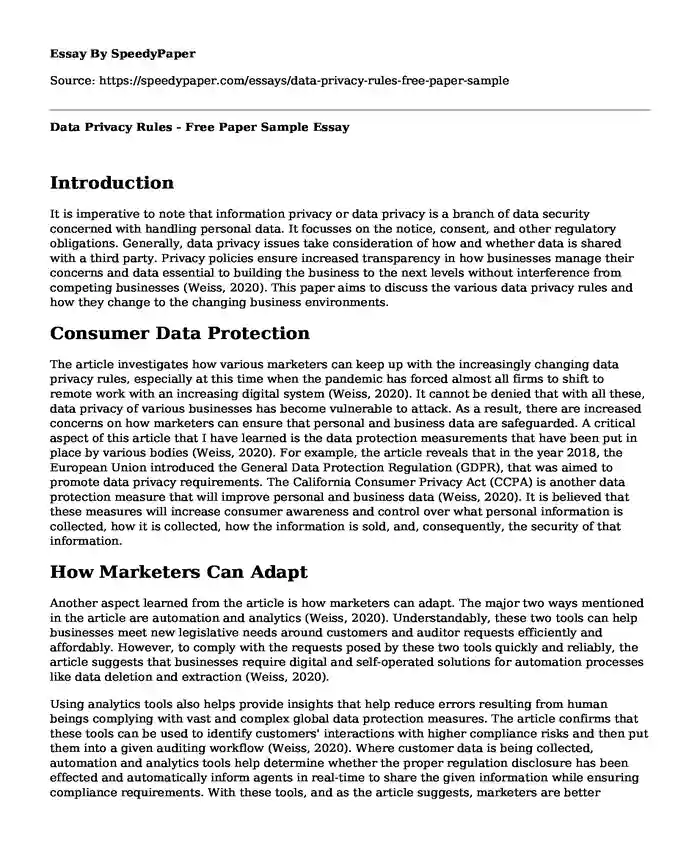
| Type of paper: | Essay |
| Categories: | Business Data analysis Cyber security |
| Pages: | 3 |
| Wordcount: | 745 words |
Introduction
It is imperative to note that information privacy or data privacy is a branch of data security concerned with handling personal data. It focusses on the notice, consent, and other regulatory obligations. Generally, data privacy issues take consideration of how and whether data is shared with a third party. Privacy policies ensure increased transparency in how businesses manage their concerns and data essential to building the business to the next levels without interference from competing businesses (Weiss, 2020). This paper aims to discuss the various data privacy rules and how they change to the changing business environments.
Consumer Data Protection
The article investigates how various marketers can keep up with the increasingly changing data privacy rules, especially at this time when the pandemic has forced almost all firms to shift to remote work with an increasing digital system (Weiss, 2020). It cannot be denied that with all these, data privacy of various businesses has become vulnerable to attack. As a result, there are increased concerns on how marketers can ensure that personal and business data are safeguarded. A critical aspect of this article that I have learned is the data protection measurements that have been put in place by various bodies (Weiss, 2020). For example, the article reveals that in the year 2018, the European Union introduced the General Data Protection Regulation (GDPR), that was aimed to promote data privacy requirements. The California Consumer Privacy Act (CCPA) is another data protection measure that will improve personal and business data (Weiss, 2020). It is believed that these measures will increase consumer awareness and control over what personal information is collected, how it is collected, how the information is sold, and, consequently, the security of that information.
How Marketers Can Adapt
Another aspect learned from the article is how marketers can adapt. The major two ways mentioned in the article are automation and analytics (Weiss, 2020). Understandably, these two tools can help businesses meet new legislative needs around customers and auditor requests efficiently and affordably. However, to comply with the requests posed by these two tools quickly and reliably, the article suggests that businesses require digital and self-operated solutions for automation processes like data deletion and extraction (Weiss, 2020).
Using analytics tools also helps provide insights that help reduce errors resulting from human beings complying with vast and complex global data protection measures. The article confirms that these tools can be used to identify customers' interactions with higher compliance risks and then put them into a given auditing workflow (Weiss, 2020). Where customer data is being collected, automation and analytics tools help determine whether the proper regulation disclosure has been effected and automatically inform agents in real-time to share the given information while ensuring compliance requirements. With these tools, and as the article suggests, marketers are better positioned to ensure that they are updated, and consumer data are highly protected through proper monitoring (Weiss, 2020).
Own Thoughts
One factor that I believe the article rightly mentioned is the increasing concern about data privacy and security, especially during the pandemic. It cannot be denied that many businesses have shifted to online operations with increased remote works leading to a shift in digital business operations (Weiss, 2020). However, with that said, it is true that with increased online operations during this period, both personal data and business data have become increasingly vulnerable to attack. The article got it right to mention the various regulations that protect data privacy at this moment and the various tools that can be put in place to ensure the reliability and effectiveness of these tools (Weiss, 2020). As a result, many consumers have been enlightened on how they can protect their data during this period of the pandemic.
Conclusion
Understandably, data security is an expensive undertaking. However, despite the business's size, safeguarding data information is a priority for small and large firms (Weiss, 2020). One factor that I think the article got wrong was to assume that all businesses are the same in terms of the size of data they keep. Therefore, I believe that the article has failed to offer ways in which small businesses can use to protect their data by offering to advise only to large businesses who can afford to install the various tools mentioned above (Weiss, 2020). Moreover, small businesses and individuals who lack enough capital cannot maintain and adhere to the regulations effectively.
Reference
Weiss, E. (2020). Data Privacy Rules Are Changing. How Can Marketers Keep Up?
https://hbr.org/2020/08/data-privacy-rules-are-changing-how-can-marketers-keep-up.
Cite this page
Data Privacy Rules - Free Paper Sample. (2023, Nov 25). Retrieved from https://speedypaper.net/essays/data-privacy-rules-free-paper-sample
Request Removal
If you are the original author of this essay and no longer wish to have it published on the SpeedyPaper website, please click below to request its removal:
- The Internet as a Vital Tool for Political Campaigns, Free Essay in Politics
- Free Essay with a Classical Architecture Critique about the US Supreme Court Building
- Free Essay Comparing Jokes: Freud and Douglas' Perspectives
- Clinical Research Administration and Replacement of Ethical Code - Paper Example
- Free Essay: Misconception That Physical, Cognitive and Mental Decline Are Inevitable in Old Age
- Societal Effect of Buying Privilege. Paper Example
- Exploring the Artistic Legacy of Bishop Bernward and Wiligelmo - Essay Sample
Popular categories




